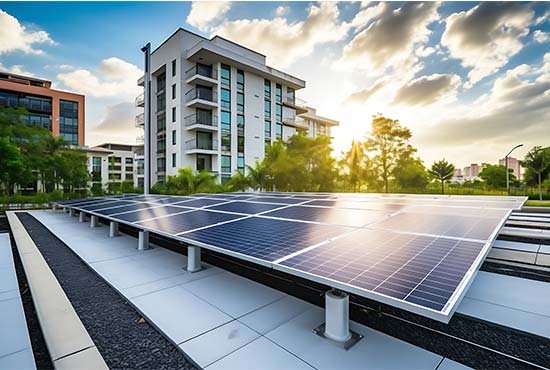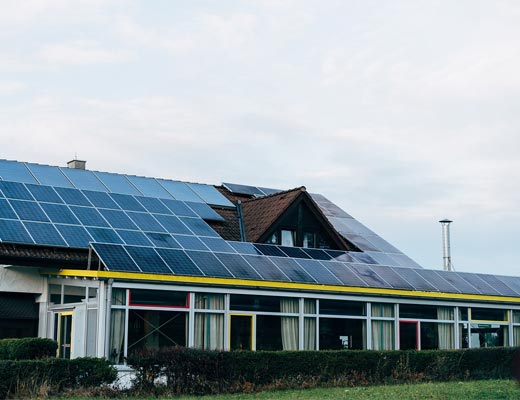India's #1 Housing Solar Company*
Trusted by 100+ Happy Homes
Our experts do the legwork. From designing the Solar for home rooftop system to handover, we represent a safe investment and guaranteed results. We provide you with customized solutions, unmatched in terms of quality and savings potential. We are glad we went ahead with Maxinfluence. They genuinely care about doing safe, high-quality installations and ensure the high-performance of your solar system through maintenance.

Subsidy for Group Housing Society/ Resident Welfare Association (GHS/RWA)
Rs. 18,000 per kW for common facilities, including EV charging, up to 500 kW capacity (@3 kW per house) with the upper limit being inclusive of individual rooftop plants installed by individual residents in the GHS/RWA
Why choose Maxifluence
One-Stop Solution for Your Housing Society

Free Home Consultation
A Maxifluence Technovate consultant will evaluate your home, answer your questions, and craft a tailored digital plan illustrating how the solar system will be installed on your rooftop.

Customized Solar Proposal
According to your needs, our team will generate a tailored proposal. Additionally, a dedicated Executive will be assigned to address your questions and provide project updates.

Documentation and Subsidy Support
We handle all paperwork from start to finish, ensuring smooth coordination with the local utility company and securing subsidies for you.

Professional and Safe Installation Guided Step-by-Step
Once you submit the advance amount, your rooftop system will arrive and be installed in a timely, clean, and professional manner, ensuring both style and efficiency.

Grid Connection
We coordinate with the DISCOM to connect your Rooftop Solar System to the power grid and install a New Solar Meter.

Activating Your New System
Activate your system to lower electricity bills and a future powered by renewable energy!

Maintenance & Auto Cleaning Services
Ensure peak performance with our comprehensive maintenance services and automated cleaning solutions.

Solar Simplified: A Homeowner's Guide to Rooftop Systems
This Handbook is a comprehensive guide—an honest initiative to bring you all the information you need before switching to solar
How much can you save by going solar
Savings to expect with solar
What's the right solar size for your society
What technologies should you choose
Govt subsidy and assistance
Common myths about rooftop solar
Housing Society FAQ
How do residential solar systems work?
Residential solar systems generate electricity by converting sunlight into usable power through photovoltaic (PV) panels. These panels are typically installed on the roof of a home where they capture sunlight and convert it into direct current (DC) electricity. This electricity is then converted into alternating current (AC) by an inverter, making it compatible with household appliances and the electrical grid.
What are the benefits of installing a residential solar system?
Installing a residential solar system offers numerous benefits, including:
Reduction in electricity bills: Solar energy can significantly reduce or even eliminate your electricity bills, depending on the size of the system and your energy usage.
Environmental sustainability: Solar energy is a clean, renewable source of energy that reduces greenhouse gas emissions and reliance on fossil fuels.
Increased home value: Studies have shown that homes equipped with solar panels tend to sell at a premium compared to those without.
Energy independence: By generating your own electricity, you become less reliant on the grid and less susceptible to utility price fluctuations.
What factors should I consider before installing a residential solar system?
Several factors should be considered before installing a solar system, including:
Available sunlight: The amount of sunlight your location receives throughout the year will affect the system's efficiency and potential savings.
Roof suitability: The size, orientation, and condition of your roof will determine the feasibility of installing solar panels.
Local regulations and incentives: Understanding local building codes, permits, and available incentives such as tax credits and rebates can impact the overall cost and feasibility of the project.
Energy usage: Analyzing your household's energy consumption patterns will help determine the appropriate size and type of solar system needed to meet your needs.
What maintenance is required for a residential solar system?
Residential solar systems typically require minimal maintenance. Routine tasks may include:
Periodic cleaning of the solar panels to remove dirt, dust, and debris that can reduce efficiency.
Inspecting for any shading issues caused by nearby trees or structures.
Checking the system's performance periodically to ensure optimal efficiency.
Inverter maintenance, as inverters may need to be replaced or serviced over time.
What is the payback period for a residential solar system?
The payback period for a residential solar system depends on various factors, including the cost of the system, available incentives, energy savings, and local electricity rates. On average, residential solar systems typically have a payback period ranging from 3 to 7 years. However, with advancements in technology and declining installation costs, payback periods are becoming shorter, making solar energy an increasingly attractive investment for homeowners.









